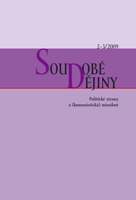Tragický případ Miroslava Dolejšího a Eugena Vrby
The Tragic Case of Miroslav Dolejší and Eugen Vrba
Author(s): Prokop TomekSubject(s): History
Published by: AV ČR - Akademie věd České republiky - Ústav pro soudobé dějiny
Summary/Abstract: This article presents Miroslav Dolejši (1931–2001), the author of Analyza udalosti 17. listopadu (Analysis of the Events of 17 November), the best-known conspiratorial interpretation of the democratic Czechoslovak revolution of November 1989. It does so, however, from a little known side of Dolejši, that is, as a talented man and political prisoner of the Communist regime, who spent a total of eighteen and half years behind bars. Dolejši was fi rst arrested in 1951, and accused of working with an American agent to found an underground youth organization that would carry out a coup d’etat. According to the author of the article this was probably an operation provoked by the Czechoslovak secret police. Dolejši was sentenced to twenty-three years in prison, of which he served nine before being released in the presidential amnesty of 1960. Afterwards he showed his exceptional abilities: though he had not fi nished secondary school, he became an expert in the fi eld of systems Anotace 525 engineering and automated systems of control and a member of several academic societies. During the ‘Prague Spring’ he was active in K 231 (or Klub 231, Klub byvalych politickych vězňů, the Association of Former Political Prisoners). In the mid-1970s, with the help of the former journalist Eugen Vrba (1918–2004), who was under secret-police surveillance, Dolejši attempted to send academic articles about Czechoslovakia to the West, for which he would receive payment. In 1976 both men were arrested. Although the offi cial dossiers did not state clearly whether Dolejši’s and Vrba’s reports contained sensitive intelligence, the two men were accused of spying and Vrba was sentenced to ten years in prison, Dolejši to eleven. Dolejši was released in 1985, twenty months before his sentence would have ended. The author claims that Dolejši’s analysis, which seeks to explain the events of November 1989 as a conspiracy of dissidents, Communists, and foreign secret services, was psychologically determined by the tragic fate of its author and that it is fair to see it as a particular way of seeking satisfaction for wrongs done. For men imprisoned in the 1950s, and who had thus been robbed of their futures, it was painful to see former Communists, albeit signatories of Charter 77, who had in several cases been involved in their persecution, taking up senior posts in public life. For Dolejši one such person was Vladimir Kolmistr (born 1930), a member of Obroda (Rebirth), the club of dissident reform-Communists, and then a member of the Czech Parliament (Czech National Council) in the 1990s. In 1950, as Chairman of the Kladno District Committee of the Czech Youth Association (Česky svaz mladeže), Kolmistr had instigated Dolejši’s expulsion from secondary school. Evidence of this is provided by the minutes of the meeting about the expulsion, which are also published here with an introduction by the historian Jaroslav Cuhra, putting them in the broader context.
Journal: Soudobé Dějiny
- Issue Year: XVI/2009
- Issue No: 02-03
- Page Range: 419-430
- Page Count: 12
- Language: Czech

